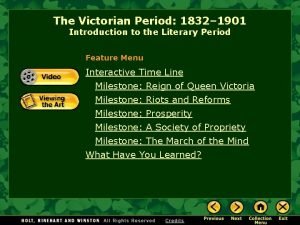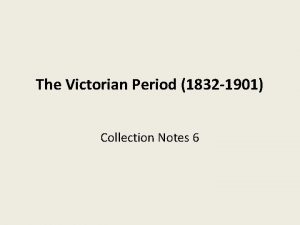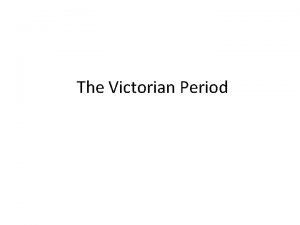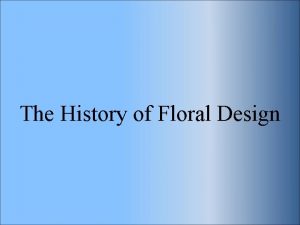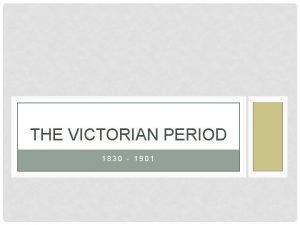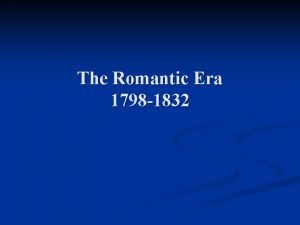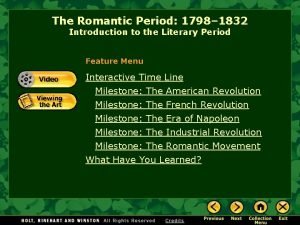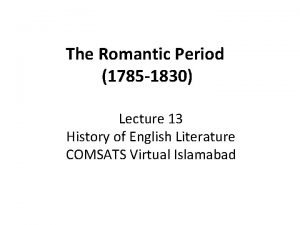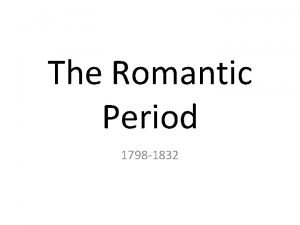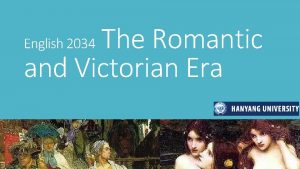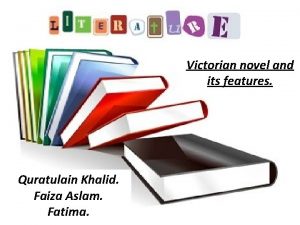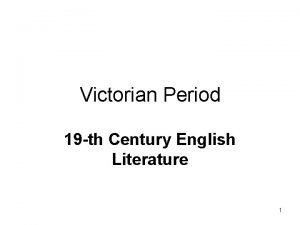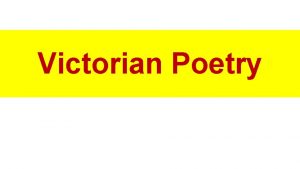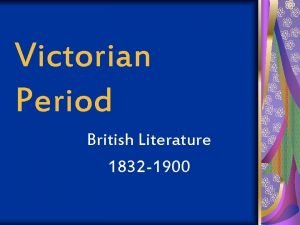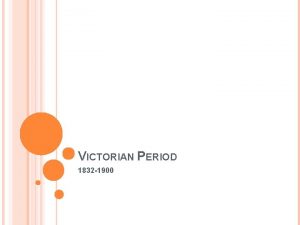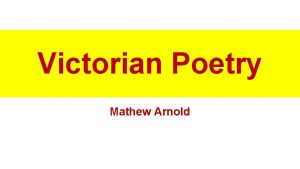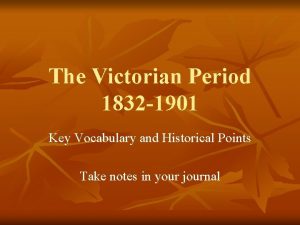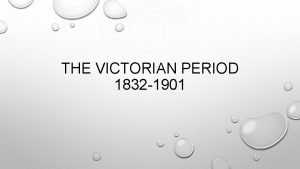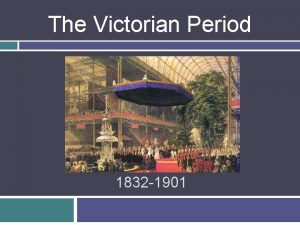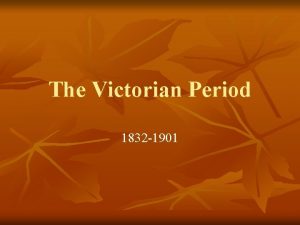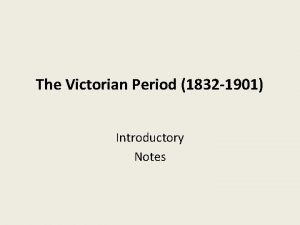The Victorian Period 1832 1901 Literary Timeline n
















- Slides: 16

The Victorian Period 1832 -1901

Literary Timeline n n n 1847 Emily Bronte publishes Wuthering Heights; Her sister Charlotte publishes Jane Eyre Karl Marx publishes The Communist Manifesto Nathaniel Hawthorne publishes The Scarlet Letter

n n n n 1859 Charles Darwin publishes his Origin of Species 1862 Victor Hugo publishes Les Miserables 1865 Lewis Carroll publishes Alice’s Adventures in Wonderland 1868 -69 Louisa May Alcott publishes Little Women 1869 Leo Tolstoy publishes War and Peace 1884 Mark Twain publishes Huck Finn 1900 L. Frank Baum publishes Wizard of Oz

Political Events 1832 -1859 n n n 1836 Mexican army defeats Texans @ Alamo 1837 Victoria becomes queen; she died in 1901 1845 Irish potato famine, nearly 1 million die 1847 Ten Hours Act limits number of hours women and children can work in factories 1858 Medical Act closes loopholes that briefly allowed women to become doctors in Britain

Political Events 1860 -1900 n n n 1861 American Civil War begins 1868 Britain stops 80 year-old practice of sending convicts to Australia 1869 Debtors’ prison is abolished 1869 Gandhi is born in India 1898 Pierre and Marie Curie discover radium

The Hungry Forties n n where bodies were Poor working buried 6 -8 deep conditions: Children n Potato Famine: Crops were injured and failed 1845 -49; ¼ of killed after falling Ireland’s population asleep at the machines emigrated; many went at the end of 12 hour to England where days they lived 10 -12/room in slums that had 2 Pollution: Industrial toilets for 250 people waste was a problem, drainage from graves

Reform movements n n n Improvements in food: More trade, more empiremeat, fruit, and margarine became regular middle class staples Improvements with goods: Factories could more cheaply make newspapers, clothing, furniture and other goods; railroads made travel and transporting of goods easier Improvements in voting: More men given the vote except for farm workers; women 30 years old could vote by 1918; all could vote @ 21 by 1928

Victorian Society n n n Society tried to control excesses and immorality of the 18 th century Issues about sex, birth and death were ignored or spoken of in euphemisms There was a double standard for women & men in issues of sex

Victorian society-authority n n Families were maledominated Women were expected to marry and take care of husband home Middle class spinsters could become teachers or governesses Working class spinsters could become servants

Victorian Society n n All people presumably accepted their stations in life For wealthy: first son inherited, other sons could go into army or church service Girls needed to marry then be a part of society; they were taught to managed a household-were considered weak

Types of Comedy n n Satirical comedy: a plot intended primarily to ridicule the foibles and vice of society Sentimental comedy: a plot in which the protagonist, no matter how immoral, reforms in the end Comedy of manners: a contrived plot in which the artificialities of a sophisticated society are exposed and satirized. The characters are more important than the plot. Dialogue is light, witty, cynical. Farce: play makes use of exaggerated, improbable situations more than plot or character.

Oscar Wilde 1854 -1900 n n n Known for writing witty epigrams, sayings, which would startle the public Born into a family that did not support his writing as a career His sexual orientation was called into question and he was eventually sentenced to two years in prison

Middle Class Society/New Wealth n n Happiness & success is possible with hard work and devotion to duty Basic beliefs came from religious one in the Church of England n n n Belief in strict moral code Against many forms of public entertainment Became a way of life: reform movements, going to church, reading the Bible, hard work

Satire of the play n n Ridicule of something to prove a point or make an improvement Satire of the word earnest/Ernest Play is built on a pun and the plot turns on a misunderstanding over the name Play is an attack on the false seriousness of high society which results in hypocrisy

Characters n n n n Algernon (Bunbury) Lady Bracknell- Algy’s aunt Gwendolyn Fairfax-Lady B’s daughter John [Jack] Worthing (Ernest) Cecily Cardew –Jack’s ward Miss Prism-governess Rev. Chasuble

Charles Dickens n n Rose from poverty to wealth and fame through his talents Aided in his success by a more literate public and improved printing and distribution of reading materials Helped people believe that things would be all right in the end through the happy endings of his works Attacks moral wrongs of the day: working conditions, child neglect, pollution
 Victorian period
Victorian period Victorian age 1832 to 1901
Victorian age 1832 to 1901 Victorian age 1832 to 1901
Victorian age 1832 to 1901 Ceremoniality
Ceremoniality Victorian period floral design
Victorian period floral design Egyptians floral design
Egyptians floral design The victorian era timeline
The victorian era timeline The romantic period 1798 to 1832 summary
The romantic period 1798 to 1832 summary 1798-1832
1798-1832 Romantic age starts from
Romantic age starts from Romantic period timeline
Romantic period timeline Romantic period 1798 to 1832
Romantic period 1798 to 1832 The romantic period 1798 to 1832
The romantic period 1798 to 1832 The victorian age summary
The victorian age summary Romantic and victorian age
Romantic and victorian age Victorian era literature characteristics
Victorian era literature characteristics Victorian period in english literature
Victorian period in english literature

